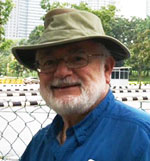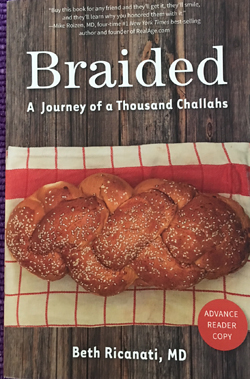Braided, A Journey of a Thousand Challahs by Beth Ricanati, MD; She Writes Press, 2018; ISBN 9787-1-63152-441-7; $16.95, 169 pages.
By Oliver B. Pollak

 RICHMOND, California — A physician who specializes in women’s health believes that the preparation of challah for a Shabbat meal, besides having obvious culinary benefits, can be a form of prayer and meditation.
RICHMOND, California — A physician who specializes in women’s health believes that the preparation of challah for a Shabbat meal, besides having obvious culinary benefits, can be a form of prayer and meditation.
Dr. Beth Ricanti, the author, became a physician, a clinician trained in internal medicine, with a practice in women’s health and wellness. She wanted to help save women’s lives. She has three children, a husband, a mother, and friends. But she was overworked with insufficient time to relax and reflect. Her day was so crowded and overcommitted that she exercised to achieve her ten thousand steps a day while opening the mail. She had expectations and did not want to disappoint anyone.
She marked her life’s turning points. She learned braille at 8. For her 10th birthday she requested Architectural Digest. She went to boarding school and spent a year in Europe. She wrote her first cookbook at 15. Her adult path took her to New York, Cleveland, Los Angeles, and she visited Israel at the age of 42.
As an art major at the University of Pennsylvania she developed skills to see things not visible to the untrained eye. As a physician she built rapport with her patients and then asked the hard questions about mental health. She wanted to be a breast surgeon, but when she realized how much more time that took, she opted for being an internist. Her patients were in pain, often sad. Sometimes she could only give them bad news, and the doctor cried. Some patients were happy. She mused, “Maybe they had easily found a parking spot. Maybe their blood pressure wasn’t too high when it was checked moments before I walked in. Maybe they knew they weren’t going to get any shots that day. Maybe they were just happy to see me.” As one of her teacher rabbis said, “Fake it till you make it.”
Well into her demanding and nerve wracking career her girlfriend challenged her to make a challah; all you need is a few simple ingredients, flour, yeast, sugar, warm water, eggs, salt, oil, it makes itself. The Jewish Community Center in Manhattan provided the recipe. Two loaves a week for ten years.
The preparation time for challah from scratch starts in the early morning, the resulting manna manifests itself at sunset. You can’t rush yeast, dough, mitzvah, or tradition. If you take shortcuts, buy the loaf at the bakery, or use a frozen challah from the freezer section, it’s not quite the same mindfulness.
It’s a prayer which you rush through at your peril, like speed davening. You cannot edit out passages, or steps in the baking process. Repetition in some literature is criticized, in prayer repetition may result in reverie.
The author loves to bake challah. On Friday you press the Pause and Reset button. You slow down and reconnect through group baking to other women. It is a mitzvah. “I knead for my needs,” food is medicine, baking with friends is community, inhaling the aroma of bread baking is uplifting. Watching your family tear or slice the loaf is gratifying. It is hands on spiritual relief, mental health and good nutrition.
*
Pollak, an attorney and professor emeritus of history at the University of Nebraska Omaha, is a SDJW correspondent now based in Richmond, California. He may be contacted via oliver.pollak@sdjewishworld.com